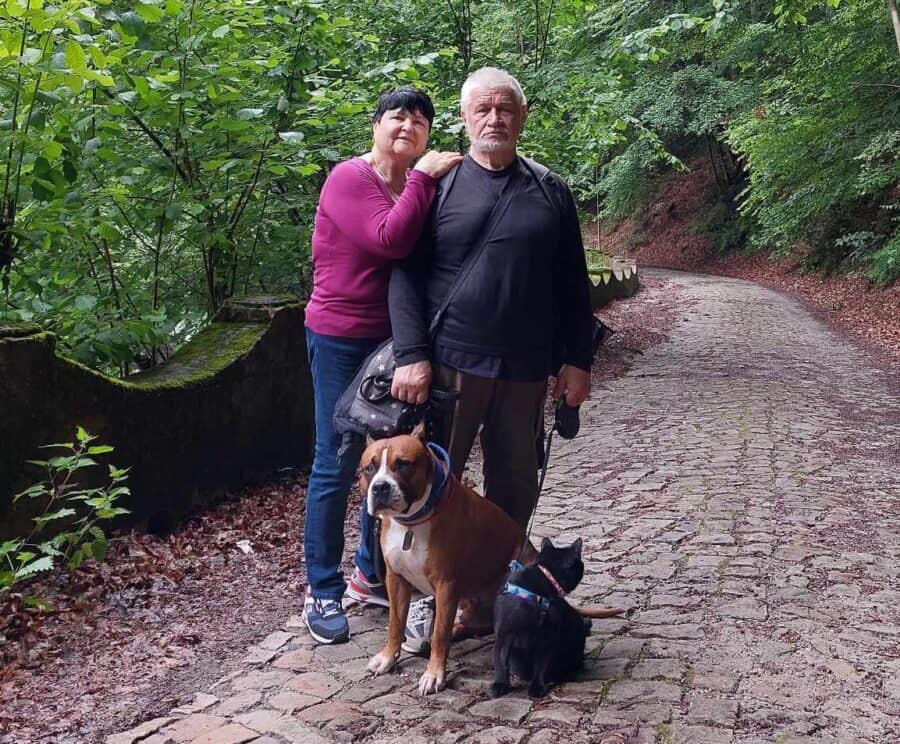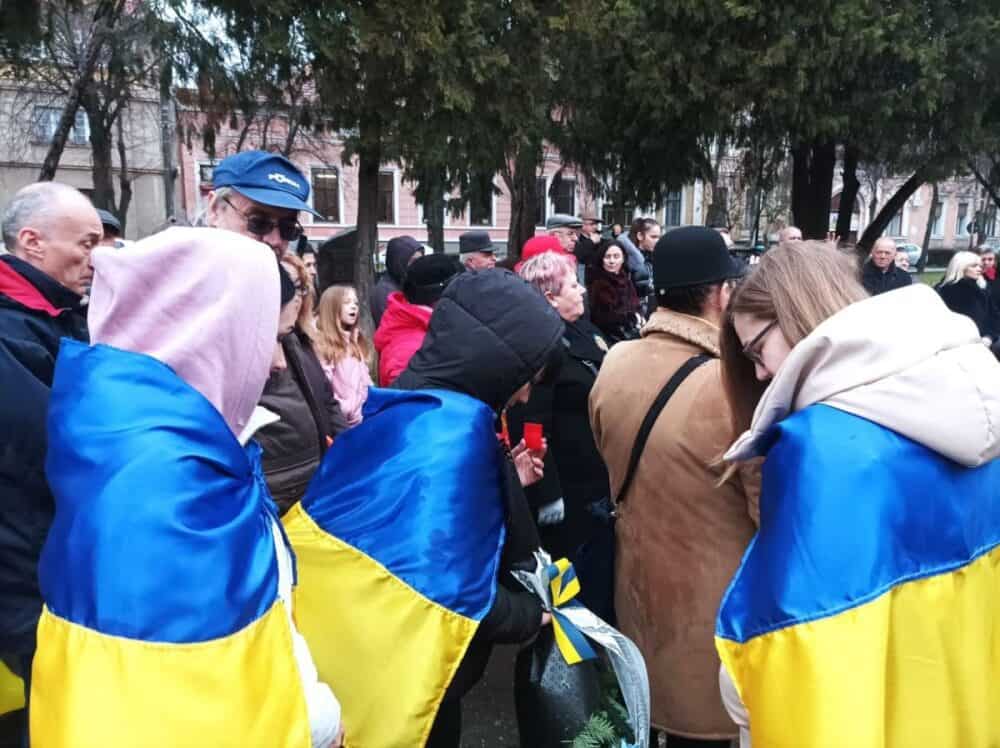Aleksandra and her parents found themselves in a foreign country with what they had managed to take out of the house in a hurry. The three fled Ukraine on 28 March, a month after the outbreak of the war, and first went to Bulgaria.
They had a hard time finding a place to live, for a reason as simple as it was complicated: they couldn’t leave their dog and cat behind. And many didn’t want to give’em home for this reason.
The family finally found a hotel that accepted them and their two pets. But after a few months, they had to start all over again after the hotel could no longer afford to accommodate refugees from Ukraine.
Read also: DATA | How much money Romania spent on Ukrainian refugees’ health. Romanians’ reactions
With the help of a Ukrainian volunteer settled in Romania, Aleksandra and her family arrived in Mamaia in early November last year. They stayed in another hotel on the Black Sea coast.
But again, things went wrong: since January, the hotel owner stopped giving them money for food, which they were entitled to through the 50/20 social programme.

Romania owes Ukrainian refugees 300 million lei
312,150,706 lei is Romania’s debt for the last 4 months.
The General Inspectorate for Emergency Situations (IGSU) stated at the request of PRESShub that the value of pending payments for accommodation and food for Ukrainian refugees for the period April-July 2023 is 63.7 million euros.
Previously, the Romanian state paid 1,251,823,627 lei for food and accommodation to Ukrainians sheltering from the war.
660,578,758 lei were allocated and paid to Ukrainian refugees in 2023 only.
The IGSU told PRESShub that it has requested the money needed for the payments from the Ministry of the Interior (MAI).
On the other hand, MAI mentioned to our publication that, for the payment of expenses for April, May and June, „a project has been elaborated which foresees the supplement of the Ministry’s budget with amounts from the Budget Reserve Fund available to the Government”.
The two institutions only hold data on payments made and overdue payments.
But they could not say how many people received the money for accommodation and meals, which the local authorities hold.
Ukrainians’ money stolen by Romanians
The 50/20 programme was initiated by the Romanian Government after Russia invaded Ukraine, in order to support refugees seeking shelter in our country. Each refugee was allocated 50 lei for accommodation and 20 lei for meals per day.
The major flaw of the programme was that the money was not given directly to the Ukrainians, but to the Romanian citizens who were hosting them. This intermediation created numerous abuses, where Romanians either kept all the money for themselves or gave to the refugees less.
Many have also developed a business on the back of the suffering of their neighbours, renting out houses, in which they have crammed more refugees, just to get more money from the state.
A change that brings a new confusion
The government decided to change the programme only when the debts had accumulated. But the damage had already been done. And the change of law, which was supposed to improve the way the money is distributed, has put Ukrainian refugees in an even more complicated situation.
Many refugees told PRESShub that the people who took them in are still waiting for some of the money they were supposed to receive in their account and some have kicked them out.
In the new assistance project, the money was supposed to go directly to the Ukrainians. But it also sets a difficult condition: Ukrainians must prove they have found a job in order to receive the money.
Read also
DATA | How much money Romania spent on Ukrainian refugees’ health. Romanians’ reactions
The owner didn’t give them a penny
Olha came to Romania on 25 November 2022 with her husband and their 8-year-old child. They arrived in Galați, where, through a Facebook page, they found a studio apartment. When they checked in, the owner promised to give them the 20 lei a day for food.
The owner then repeatedly told them that he was also waiting for the money to be transferred and assured them that they would receive their share when he would receive it from the state.
Not only did the landlord not give them money for food, but in May, when the aid programme ended, he started asking them for rent of €250 a month.
The family found out that they had been tricked. In fact, the state had made several payments to the owners, and when Olha spoke to the Romanian who had promised to give them the money from the state, he admitted that he had actually received the money, but that he would not give them anything, because he had two children to raise.
The police couldn’t help them
Olha has asked the landlord several times for her money back, as she ran out of money after discovering she had breast cancer and all the family’s financial reserves were spent on treatment.
The Romanian remained unmoved. Now Olha and her family are thinking of returning to Ukraine, but they say there is a huge problem at the moment with medication and access to the treatment Olha needs.
They also filed a complaint with the police, on 31 May, but the authorities have not taken any action so far.
Romania owes Ukrainian refugees 300 million lei. „Standing on their money „
Mihaela Munteanu, communications director at the Federation of Non-Governmental Organisations for Social Services (FONSS), confirms that there is a problem with the aid programmes run by the government to support Ukrainian refugees.
„There is the 50/20 program, but it has changed. Instead of giving money to the owners, it should be given to the Ukrainians. T
he new programme started in May, but so far nobody has seen a penny. Ukrainians don’t have a place to live, they don’t have meal money, they live on their own money.”
Mihaela Munteanu explained to PRESShub that the money from the new programme should have been transferred 28 days after a Ukrainian refugee had submitted an application. However, the payments have not been made even two months after it started.
„The new programme has been established by a Government Decision and clearly states the steps. In 28 days, they were supposed to start payments. The City Hall had 3 days to evaluate the Ukrainians’ requests, after 3 days it had to confirm to the Ukrainians that they would receive the money and make a request to the ISU.
The ISU was supposed to check the requests from the city hall and give them the money and the city hall was supposed to pay the Ukrainians”.
How the social programme was changed
Since 1 May, the 50/20 programme to support Ukrainians has been modified. The new financial aid would be granted until 31 December 2023, but with additional conditions:
- in the first month, the applicant must be a beneficiary of temporary protection, register with the local authority of residence and present a bank statement from a bank from Romania.
- for the following three months, both the applicant and the family members must be legally registered as employees with an employment contract or be registered in the unemployment insurance system with the Regional Employment Agency.
- from the fifth month until the end of the year, the applicant and family members must be employed and the children must be in school.
How many Ukrainians have a work contract in Romania
15,906 Ukrainian refugees requested information from National Employment Agency in just 3 months
The Ministry of Labour said, at the request of PRESShub, that in order to make it easier for Ukrainians to enter the Romanian employment market, it has decided that refugees can benefit from temporary protection which provides them with several benefits, such as a residence permit, medical assistance and the right to work.
1,956 Ukrainians have registered with the National Employment Agency to receive information, counselling and mediation services on the labour market since the beginning of the conflict in Ukraine until the end of April this year.
15,906 Ukrainians requested information on the job market from the National Employment Agency, with the change in the conditions for social aid, the number of people applying for this service increased substantially. Data is for 1 May to 31 July.
10,234 Ukrainians are registered with an employment contract
From 24 February 2022 to 30 April 2023, 7,571 new employment contracts of Ukrainians were registered, concluded either through National Employment Agency or directly by contacting the employer.
From 1 May to July, a further 2,663 such contracts were reported.
A mother with two kids depend on help from friends
Oksana fled from Ukraine with her two children. She hasn’t yet received all the money from the 50/20 programme either and can barely make ends meet. All Oksana wants now is to be able to raise her two children.
„The 50/20 program ended in April, but people haven’t received the money. The government started a new program in May, but people didn’t get anything.
The Romanians try to help in any way they can, to provide jobs, but there are also people who cannot work because they have very young children, babies, and can not afford to pay a person to stay with their children.
Some Ukrainians tried to send messages or emails to the European Commission, but the problem was not solved.”
Oksana admits that she wouldn’t have been able to manage with her two children if she didn’t have the support of her Romanian friends, who also support her financially.
„The last time we received money from the 50/20 program was at the beginning of May, but it was on account of January and February.
Before we came here, people tried to take what they could with them or call on extended family or friends. I asked my friends here to help me and that’s how I manage to buy what I need for my two children, but there are other expenses.”
Oksana also told us that she can’t even find a job because she has a 4-year-old child who goes to kindergarten and another who is a few months old. But even having her eldest son in kindergarten means extra expenses.
Read also another project supported by Science+
VIDEO The pandemic from the pandemic. COVID-19 has affected us mentally. What are we doing?
2 hours on the road to get to kindergarten
„My eldest child goes to kindergarten, but this involves some costs for me. I have to buy a ticket for the subway or bus, drop the child off, come home, and at lunchtime pick him up and come back. For me, for a person in my situation, it costs a lot.
I can’t go to work now because I also have a little baby, a few months old, so it’s impossible.
My eldest goes to kindergarten, but it’s quite far away and I can’t move him to a closer one because they are expensive. I managed to get a place at a free kindergarten, but it’s a two-hour drive.”
Oksana still hopes to receive this money. However, what she wants most is to be able to give her two children a normal life and return home.
„It’s quite hard for us. We still hope that the situation will change. We didn’t come to Romania because we wanted to, we came because of a critical situation. We are looking forward for this money.
I want to be able to give my children a normal life. We want to return to normality, we want to return home, but the situation there is critical.”
I can’t let my kid at kindergarten
There are many refugees, mostly women with young children, who are unable to find work. Ana, a Ukrainian who came to Romania in early March last year with her 4-year-old son, is in such a complicated situation.
„I have a 4-year-old child who is diagnosed with a mental health problem and because of this he does not adjust to kindergarten.
My child is not able to stay in kindergarten for more than 2-3 hours, so I have to stay with him all the time.”
Ana says she is still waiting for the money for the last months of the old aid programme that ended more than three months ago.
„The last time we received the money was the last day of May but the money was for January and February. We didn’t get the money for March or April under the old programme.”
Ana also had problems with her landlord, who refused to give her the amount for food and is now asking her to pay the full rent for the last 5 months.
„The person I was living with was getting money under the program, both for accommodation and food. However, he and other landlords were not giving us money for food, which became a problem.
The landlord told me that I now have to give him in August all the rent money from April until now, because he didn’t get any more help from the government.”
I’m thinking of going back to Ukraine
As in Olha’s case, the police didn’t help Ana either. Given similar situations, many refugees preferred to return to Ukraine.
„The police didn’t want to help us and it was a terrible situation because many Ukrainians chose to go back to Ukraine, even though there is war.”
Ana is thinking of returning to her country. So far she has managed to live on the money she managed to take with her when she left Ukraine, but it has run out.
„I’m thinking of doing this too, because I don’t have the money to live in Romania anymore. I prefer to go where is war because I don’t have money.
I managed to live with the money I left from Ukraine and tried to buy only the bare necessities. I used to shop only on sale and take only a few. Now all my money is gone.
Lack of financial support affects Romanians too
But the situation is not only difficult for the Ukrainians. The lack of social aid has also affected the Romanians who received the refugees. Dan, from Timisoara, is still waiting to receive money from social programmes.
„I have a Ukrainian family, husband, wife, their son and grandmother. The two adults work and are good people. The problem now, especially since the 1st of May, is theirs but also mine.
Until last year in December, they gave us the money regularly, then the fun started. We received the money for January, February and March in May, but not for April.”
He doesn’t want to ask for money from the four Ukrainians living in the same house with him, at least until they get their welfare.
„The family lives on the ground floor of my house. I didn’t ask them for money, hoping the state debt would be paid. At the moment, I pay utilities, I pay everything. We are all waiting for the money. Both the Ukrainians and us Romanians. I didn’t want to ask them for money until the aid comes. It’s very hard for me, I have to borrow money to pay the utilities.”
The Romanian doesn’t want to kick the four out of the house because he has become attached to them.
„I’ve become attached to them, I can’t kick them out of the house, they’re accustomed here, I can’t kick them out. Where can they go? I’ll manage somehow. I’m waiting for the money to come in. What should I do? They’re helpless. They’re good people, I get on well with them and I really don’t want to kick them out.”
Follow PressHUB on Google News!
Article published in the Science+ programme.





